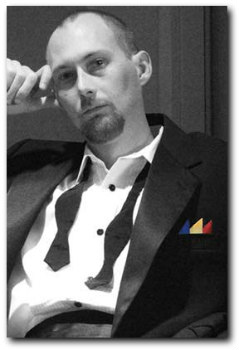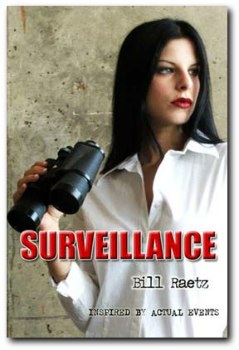
HOMEWesley Britton’s Books,
|
Spies on FilmSpies on Television & RadioSpies in History & LiteratureThe James Bond Files |
|
Spies in History & Literature ~ Inside the World Espionage
Bureau – Q&A with WEB Creator Bill Raetz
By Wesley Britton
Bill Raetz, Surveillance, 2007 
Bill Raetz, author of the “World Espionage Bureau” novels In the aftermath of the Cold War, the careers of many writers of literary espionage seemed to mirror the fates of actual agencies like the often floundering CIA and the dying KGB. In both fact and fiction, between the fall of the Soviet Union and 9/11, it wasn’t always clear just who the new bad guys were. Likewise, without the East/West geopolitical duels of the previous four decades, what fodder did spy novelists have in the new world order? Some writers, as in Daniel Silva, turned their attention to the grim realities of Middle Eastern concerns. Old masters like John Le Carré or Robert Littell either abandoned their stories of traitors and moles or crafted retrospectives exploring the meaning of it all. Best-selling creators like Tom Clancy and Clive Cussler simply handed the torch on to a new generation of fictional offspring – Jack Ryan, Jr. Dirk Pitt, Jr. But while these new chips off old blocks didn’t always become successful franchises like their forbearers, younger writers spotted fresh opportunities in a genre that wasn’t as cold as some thought. Bill Raetz, for example, claims he began sketching out his ideas for his World Espionage Bureau (WEB) books “around the time the first brick was knocked out of the Berlin Wall.” Drawing from his background in law enforcement and information technology, as well as his interest in foreign languages and cultures, in 2005 Raetz introduced his WEB agents in his first novel, Berlin Files. His savvy with self-publishing and online marketing then led to a series of highly successful WEB novels including Romanian Skylark (2006) and his most recent entry, Surveillance (2007). Spywise.net recently caught up with Bill as we had some questions about Surveillance, a book we thought any lover of fast-paced action-adventure would enjoy. We thought readers who hadn’t experienced WEB might like to learn about this series and that previous fans might like insights into Bill’s creative process. So, for both old and new readers, the interview below is full of revelations – including news about a major shift in the WEB universe. For example, his forthcoming The Lie Detector (2008) won’t be like any WEB book Bill’s offered so far. What will be different? We’ll let Bill explain – Q – What are the origins of your World Espionage Bureau? What books or films shaped its concept? I’ve always been hooked on James Bond and Mission: Impossible, so I suppose there are flavors of each in the World Espionage Bureau. I enjoy the idea of a strong agent as the main character, as well as the aspect of him working within the structure of a team and each member lending a unique trait or skill to the plot. Q – For new folks who've not read any WEB books, can you give a quick overview of your main characters? My main character is Bryce Attewelle, and he’s about as no-nonsense as they come. He’s a rugged Australian turned federal agent who marches to his own beat. Bryce works with a cornucopia of other talented agents; a southern gent who balances him, a studious analyst from Stockholm, a square peg of a technology officer, and a Hungarian femme fatale. The teamwork is dynamic because they’re the type of people you know from your office or would rub elbows with in a bar. Look for Bryce to take even more of a central role and mingling with some fresh faces in future books. Q – In some ways, your WEB stories and characters seem to hearken back to thrillers of old with plenty of action and little in the way of political overtones. With just about every WEB agent a smoker, these folks aren’t exactly politically correct! My mission is to entertain, and to do so without “cookie cutter” characters. I often hear from my readers that they love Bryce Attewelle because of his boldness and how he speaks his mind. I think that the majority of readers enjoy, to a certain extent, living vicariously through him because he always seems to get away with what we can’t in our day-to-day lives. For me, it’s all about crafting tangible characters. Q – What do you think your WEB books offer that is new and different from your predecessors? I believe that my stories fill the void left at the end of the Cold War when spy fiction was supposedly dying. My focus has been – and always will be – the heart of a spy’s mission. It’s there that my readers are captivated by what unfolds, completely independent of what is currently going on in the news. Q – What challenges does a new writer have working in a genre that’s been probed for over a century? That’s an excellent question, and one I’ve put to myself many times, especially early on. As I mentioned, spy fiction was said to have fizzled out after the collapse of the Soviet Union. Those of us watching the art of espionage from the bleachers witnessed a shift from human intelligence to electronic intelligence. Speaking strictly from an entertainment standpoint, there no longer seemed to be wind in the sails. I think the struggle for any writer of this genre is to constantly look for new avenues. If writers had given up easily, Law and Order would have never come around after Perry Mason. There is no shortage of material, but adaptation and packaging have become more important than ever. Q – Are the technological and operational details based on personal experiences or research? Purely by research. I was once asked, somewhat jokingly, if my books could be found in a store’s Autobiography collection. That’s simply not the case . . . but I’ll accept the compliment. Q – What were the actual events that inspired your newest novel, Surveillance?  Surveillance blends the world’s two oldest professions. I read an article about how a “lady of the night” could be used to extract information from someone more easily than an agent – and more effectively, in some cases. I had the book brewing instantly. I read another piece about Russian air defense systems being sold to Tehran and decided that the two ideas would make for an entertaining novel. I did more research on each story and began my outline. A few weeks into my first draft, I saw a sign inside a bus warning that the bus was under twenty-four hour surveillance, and that had me thinking of how few things these days are not caught on film. That’s what gave me the idea of a camera in the right place at the wrong time – and what it catches. Q – Do you think your characters change or evolve in the series? My characters go through a maturation by past experience. None of them have “seen it all.” Some of them think that they have, which is always good material for a new novel. Q – Why did you choose to publish these books as an independent publisher? I chose independent publishing for a variety of reasons. Chief among them – I enjoy having complete control of my work, from the manuscript to the cover. But with that freedom comes the responsibility to produce very solid, print-worthy fiction. It’s an obligation I take quite seriously and willingly. It’s absolutely a labor of love, and the return on my investment has far exceeded my wildest dreams. Q – Are there other writers out there now you enjoy and recommend? How much space do I have? Anna Funder’s Stasiland is a marvelously crafted work. Lawrence Block is one of my all-time favorites, and I’ll be running to the store when Hard Case Crime releases his newly discovered book, Killing Castro. James Patterson is another favorite, especially Honeymoon. And I suppose it was Mr. Sherlock Holmes who started my interest in mysteries when I began reading Sir Author Conan Doyle in the fourth grade. Q – What are the future plans for WEB? I’ll be letting my main character guide you in future books. It’s going to be the same WEB, only a bit more gritty and hardboiled, and from a fresh perspective. I’m excited about the new series because it is very noir. Fans of my original series will not be disappointed, and lovers of classic crime/spy fiction are in for a treat. You heard it first on SpyWise! To learn more about Bill Raetz’s work, check out his Author’s Page on Amazon. |